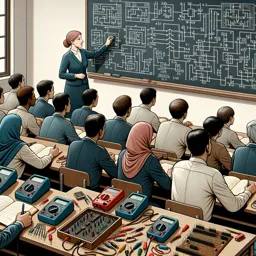Enroll in the free Solar Panel Installation and Maintenance for Electrician course. Get certified and explore the future of solar energy with 79 pages of expert content!
Course content
Introduction to Solar Energy Systems
2History and Development of Solar Technology
3Basics of Photovoltaic (PV) Cells
4Basics of Photovoltaic (PV) Cells: Introduction to Photovoltaic (PV) Technology
5Basics of Photovoltaic (PV) Cells: How PV Cells Convert Sunlight to Electricity
6Basics of Photovoltaic (PV) Cells: Materials Used in PV Cells
7Basics of Photovoltaic (PV) Cells: Manufacturing Processes of PV Cells
8Basics of Photovoltaic (PV) Cells: PV Cell Efficiency Factors
9Basics of Photovoltaic (PV) Cells: Temperature Effects on PV Cells
10Basics of Photovoltaic (PV) Cells: Innovations in PV Cell Design
11Basics of Photovoltaic (PV) Cells: Challenges in PV Cell Production
12Basics of Photovoltaic (PV) Cells: Lifecycle and Durability of PV Cells
13Basics of Photovoltaic (PV) Cells: Recycling and Disposal of PV Cells
14Basics of Photovoltaic (PV) Cells: Emerging PV Cell Technologies
15Basics of Photovoltaic (PV) Cells: Comparative Analysis of PV Cell Types
16Basics of Photovoltaic (PV) Cells: PV Cell Testing and Quality Control
17Basics of Photovoltaic (PV) Cells: Economic Aspects of PV Cell Manufacturing
18Basics of Photovoltaic (PV) Cells: Environmental Impact of PV Cell Production
19Types of Solar Panels: Monocrystalline, Polycrystalline, Thin-Film
20Understanding Solar Radiation and Solar Angles
21The Physics Behind Solar Panels
22Components of a Solar Energy System
23Components of a Solar Energy System: Solar Charge Controllers: Types and Functions
24Components of a Solar Energy System: DC and AC Disconnects in Solar Systems
25Components of a Solar Energy System: Junction Boxes and Connectors
26Components of a Solar Energy System: Solar Monitoring and Control Systems
27Components of a Solar Energy System: Grounding and Bonding in Solar Installations
28Components of a Solar Energy System: Cabling and Conduits for Solar Systems
29Components of a Solar Energy System: Surge Protection Devices for Solar Installations
30Components of a Solar Energy System: Lightning Protection for Solar Energy Systems
31Components of a Solar Energy System: Combiner Boxes and Their Role
32Components of a Solar Energy System: Microinverters vs
33Components of a Solar Energy System: Optimizers and Their Benefits
34Components of a Solar Energy System: Solar Racking and Mounting Hardware
35Components of a Solar Energy System: Utility Interface Equipment for Solar Systems
36Components of a Solar Energy System: Solar Tracking Systems and Their Advantages
37Components of a Solar Energy System: Heat Sinks and Cooling Solutions for Solar Panels
38Solar Inverters: Types and Functions
39Solar Batteries and Energy Storage Solutions
40Solar Panel Efficiency and Performance Metrics
41Site Assessment and Analysis for Solar Installation
42Designing a Solar Power System
43System Sizing and Load Analysis
44Shading Analysis and Tools
45Structural Considerations and Roof Types for Solar Installation
46Selecting the Right Mounting System
47Electrical Components and Wiring in Solar Installations
48Understanding Solar Panel Specifications and Product Data-Sheets
49Safety Protocols and PPE for Solar Installation
50Tools and Equipment for Solar Panel Installation
51Installing Solar Panels: Step-by-Step Process
52Testing and Commissioning of Solar Systems
53Net Metering and Grid Connection Basics
54Energy Monitoring Systems and Software
55Troubleshooting and Common Issues in Solar Systems
56Maintenance Practices for Solar Panels
57Cleaning and Protective Measures for Longevity
58Inspecting Electrical and Mechanical Components
59Understanding Warranties and Service Agreements
60Permitting and Legal Compliance in Solar Projects
61Building Codes and Standards for Solar Installations
62Understanding Renewable Energy Incentives and Tax Credits
63The Role of Electricians in Solar Energy Projects
64Training Requirements for Solar Installers
65Future Trends in Solar Technology
66Environmental Impact of Solar Energy
67Case Studies of Successful Solar Installations
68Communication Skills for Solar Technicians
69Customer Service and Client Consultation in Solar Projects
70Estimating Cost and Budgeting for Solar Installations
71Marketing and Business Opportunities in Solar Energy
72Developing a Solar Installation Portfolio
73Special Considerations for Commercial vs
74Integrating Solar with Other Renewable Energy Systems
75Battery Backup and Off-Grid Systems
76Understanding Energy Markets and Solar Economics
77Technical Advancements in Solar Technologies
78Solar Industry Standards and Best Practices
79International Regulations and Global Market Trends in Solar
Course Description
The Solar Panel Installation and Maintenance for Electricians course offers a comprehensive exploration into the realm of solar energy systems. This professional course, nestled within the Electrician subcategory, consists of 79 pages of in-depth content specifically designed to equip professionals with the fundamental knowledge and technical skills required in the burgeoning solar energy industry.
The course begins with an introduction to solar energy systems, providing a broad overview of solar technology's history and development. Participants gain insight into the transformative journey of solar panels and their rising importance in the global energy landscape.
An integral part of the course is the thorough examination of photovoltaic (PV) cells. From understanding the basics of PV technology to dissecting how these cells convert sunlight into electricity, students delve deep into the materials, manufacturing processes, efficiency factors, and environmental impacts associated with PV cells. Emerging technologies and innovative designs are highlighted, showcasing the dynamic evolution of solar technology and its potential for future advancements.
Types of solar panels, including monocrystalline, polycrystalline, and thin-film, are detailed, offering students the knowledge needed to differentiate and select suitable panel types for varying applications. The course further explains solar radiation and angles, along with the underlying physics that enables solar energy conversion.
The program dissects the components essential to a solar energy system, covering topics from solar charge controllers to solar racking and mounting hardware. It explores the myriad of technical components such as inverters, batteries, DC/AC disconnects, and optimizers, along with their respective functions and benefits within solar installations.
Site assessment and analysis play a crucial role in this course, guiding students through the process of designing and sizing solar power systems. Key considerations such as shading, structural aspects, and mounting system selection are discussed, ensuring comprehensive preparation for real-world installations.
Equipping participants with practical skills, the course offers a step-by-step guide to installing solar panels. It emphasizes safety protocols, necessary tools, and testing techniques crucial for the successful commissioning of solar systems. Insights into net metering, energy monitoring, and troubleshooting common issues further solidify the participant’s ability to handle multifaceted solar projects.
Maintenance and longevity are central themes, with strategies on inspecting electrical and mechanical components, understanding warranties, and ensuring legal compliance. The program also emphasizes the role of electricians in solar energy projects, advocating for ongoing training to stay abreast of future trends and technological advancements.
To support entrepreneurial endeavors, the course covers aspects of marketing, cost estimation, and the development of a solar installation portfolio. Topics such as renewable energy incentives, tax credits, and economic impacts bolster the participant’s understanding of both the financial and ecological benefits of solar projects.
The Solar Panel Installation and Maintenance for Electricians course concludes by casting a forward-looking vision on the global market trends and international regulations influencing the solar energy sector, readying electricians to capitalize on the expanding opportunities within this vital industry.
This free course includes:
7 hours and 48 minutes of audio content
Digital certificate of course completion (Free)
Exercises to train your knowledge
100% free, from content to certificate
Ready to get started?
In the app you will also find...
Over 5,000 free courses
Programming, English, Digital Marketing and much more! Learn whatever you want, for free.
Study plan with AI
Our app's Artificial Intelligence can create a study schedule for the course you choose.
From zero to professional success
Improve your resume with our free Certificate and then use our Artificial Intelligence to find your dream job.
You can also use the QR Code or the links below.



























